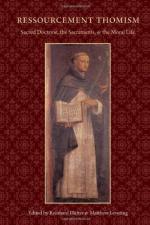|
This section contains 2,905 words (approx. 10 pages at 300 words per page) |

|
The epithet "Thomist" has been applied since the fourteenth century to followers of St. Thomas Aquinas; the earlier "Thomatist," occasionally used, was dropped toward the end of the fifteenth century. The term has a different implication according to the three main historical periods that can be distinguished. First, until the beginning of the 1500s, during a period of vigorous Scholasticism and competition among several schools, Thomism stood in metaphysics for the doctrine of a composition of essence and existence in all created beings; and in noetics it opposed both nominalism and the Neoplatonic concept of illumination by the Ideas. Second, from the sixteenth until the eighteenth century Thomism flourished in the golden age of Spanish Scholasticism. (At this time Thomists unreservedly applied to theology the metaphysical concept of the premotion of all secondary causes by the first cause.) Third, beginning about the middle of the nineteenth century there...
|
This section contains 2,905 words (approx. 10 pages at 300 words per page) |

|


